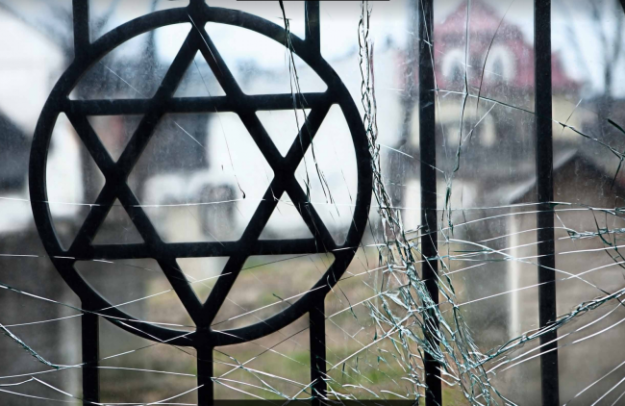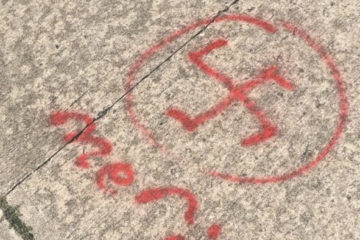Why communities must change everything to combat antisemitism

By Jackie Congedo and David Bernstein
The resurgence of antisemitism on both sides of the ideological spectrum, exhibited in novel and sometimes deadly ways, demands that Jewish communities reevaluate priorities and create new strategies to combat it.
In the latter part of the 20th century, American Jews enjoyed a welcome respite from history. Antisemitism plummeted. Many thought that at least in the United States, the oldest hatred had become a minor threat.
Fast forward 25 years, and we now find ourselves fighting a battle against antisemitism on an unprecedented two fronts, with no end in sight.
First on the left, with the end of the Camp David peace process and subsequent violence in the Palestinian territories in the early 2000s, we saw the beginnings of the “New Antisemitism” aimed primarily at the Jewish state.
The birth of the BDS movement and a broader delegitimization campaign bore the hallmarks of bigotry rather than mere criticism of Israeli policy. And it’s only gotten worse. These same forces have exploited today’s intersectional discourse, further spreading antisemitism in far left-wing circles and threatening to break into the mainstream, as is evidenced in Europe.
Then on the right, we are experiencing a revival of the old antisemitism, with deadly consequences. The “Unite the Right” rally in Charlottesville two years ago was a rude awakening as hundreds of white nationalists surrounded a synagogue chanting “Jews will not replace us.”
Jews worshipped safely in the United States for 350 years until a gunman stormed the Tree of Life Synagogue in Pittsburgh. This terrifying “first” was followed only six months later by an attack in Poway, Calif., and now a series of arson attacks in Boston. Just like left-wing antisemitism, there is a danger that the virus will proliferate beyond its ideological quarters.
Arguing over which “wing” of antisemitism poses a greater threat is an exercise in futility. Both are dangerous and, unfortunately, neither shows signs of abatement. America’s hyper-polarized political environment is fertile ground for all manner of extremist voices. The transition underway from an industrial to a post-industrial economy is wreaking havoc on traditional sources of income, generating further inequality, and exacerbating social tensions, all of which fuels bigotry, xenophobia and antisemitism. We should buckle up for the long-haul.
Nonetheless, this moment calls for thoughtful strategy, not knee jerk responses borne out of hyperbolic panic about “history repeating itself.”
While some draw parallels to the 1930s, Jews are, in fact, more “warmly” regarded by Americans than any other religious group, according to a recent Pew study. Our myriad allies stepped up in droves after the attacks in Pittsburgh and San Diego. A Jewish response rooted in misplaced hysteria undercuts our ability to strategically anticipate what is likely ahead, and to prepare for that reality.
While antisemitism on the right and left are different, both require our attention. Here’s how we can transform our communities in order to effectively meet this serious challenge:
1. We need to adopt a culture of security. Anyone who has ever visited another Diaspora Jewish community knows that Jewish communities abroad invariably place a high premium on security. The American Jewish community has always been an exception. Many American Jewish communities have already invested heavily in security at local institutions and synagogues. Thankfully, with organizations like the Secure Community Network in place, local communities have the expertise they need to develop a culture of security. We can no longer be lax.
2. We need to strengthen and grow our civic alliances. Jewish communities need more friends on both sides of the political spectrum. We need stronger ties to Latinos, African Americans, Asian Americans, Catholics, Evangelicals, Mainline Protestants, city council members, governors, business leaders, law enforcement, university administrators, and others. We need to go deeper and wider. The more people we know, the more relationships we build, the more effective we will be in safeguarding the pluralistic society that has made America a uniquely welcoming place for Jews and other minorities.
3. We need to train and equip a generation of activists. To ameliorate hyper-polarization, which gives rise to antisemitism, we need to cultivate a generation of Jewish leaders who can go beyond their ideological bubbles and productively engage with people who think differently. We must all learn to hold multiple truths and to speak with nuance. We must help emerging activists understand that compromise, moderation, and civility — too often dismissed as qualities of the weak-willed — are actually exemplars of courageous and transformative leadership.
4. We need to become more sophisticated in publicly combating antisemitism. For many years, our only approach to fighting antisemitism was to condemn and marginalize. We denounced bigoted speech, hoping it would flee to the margins. But that approach fails us in certain contexts, and it’s time we expand our repertoire. We need to learn when to condemn, and when to engage. When to isolate, and when to accept a heartfelt apology. We need new approaches to educating the public about what we consider antisemitism — especially when it’s not clear-cut — before we censure the guilty party, because not everyone sees what we see.
5. We need to strengthen fundraising around security and community relations. With its network of relations with non-Jewish leaders and organizations, JCRCs are a Jewish community’s best vehicle for combating antisemitism. Federations can benefit by embracing their JCRCs and highlighting their impact in efforts to identify and energize donors.
6. We need to invest in local communities with smaller Jewish populations. Antisemitism flourishes in communities where there is not a strong Jewish presence. From there, it incubates and spreads. We need to support smaller Jewish communities with more resources, guidance, and tools to effectively combat antisemitism.
We have our work cut out for us. It is a shift we must make.
Jackie Congedo is director of the Jewish Community Relations Council of the Jewish Federation of Cincinnati. David Bernstein is president and CEO of the Jewish Council for Public Affairs. This piece was originally published at ejewishphilanthropy.com.
To read the complete July 2019 Dayton Jewish Observer, click here.



